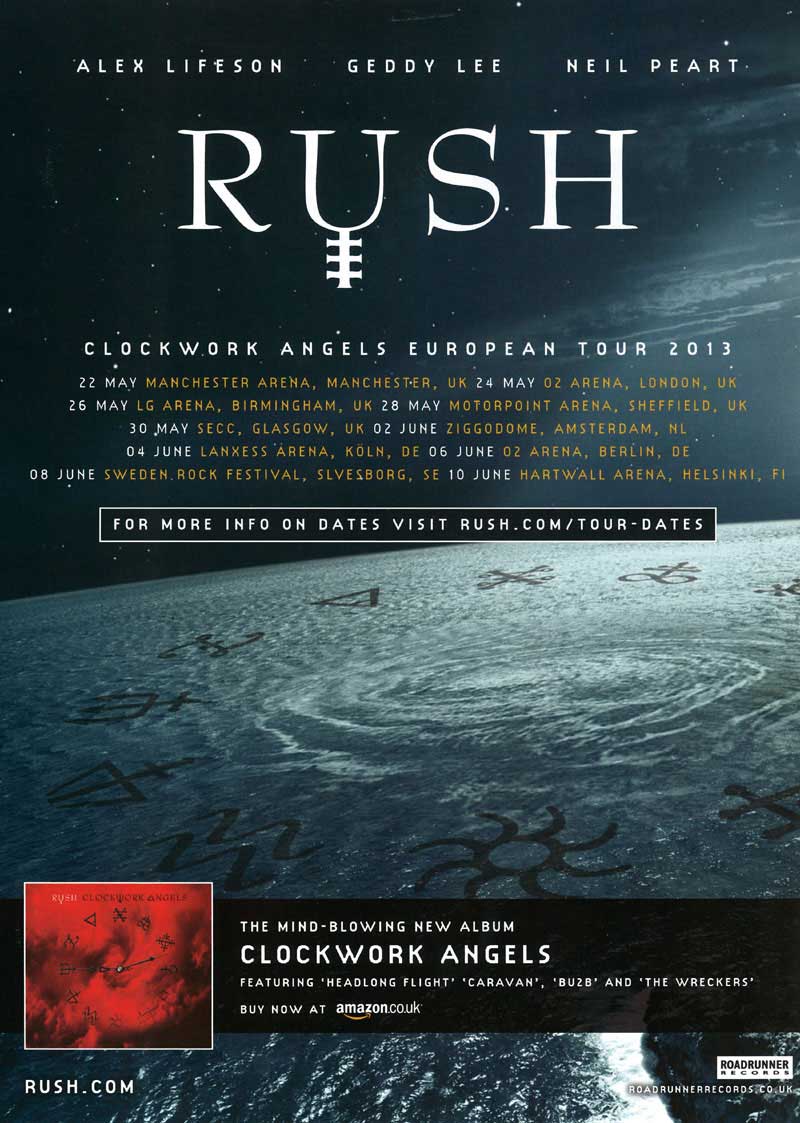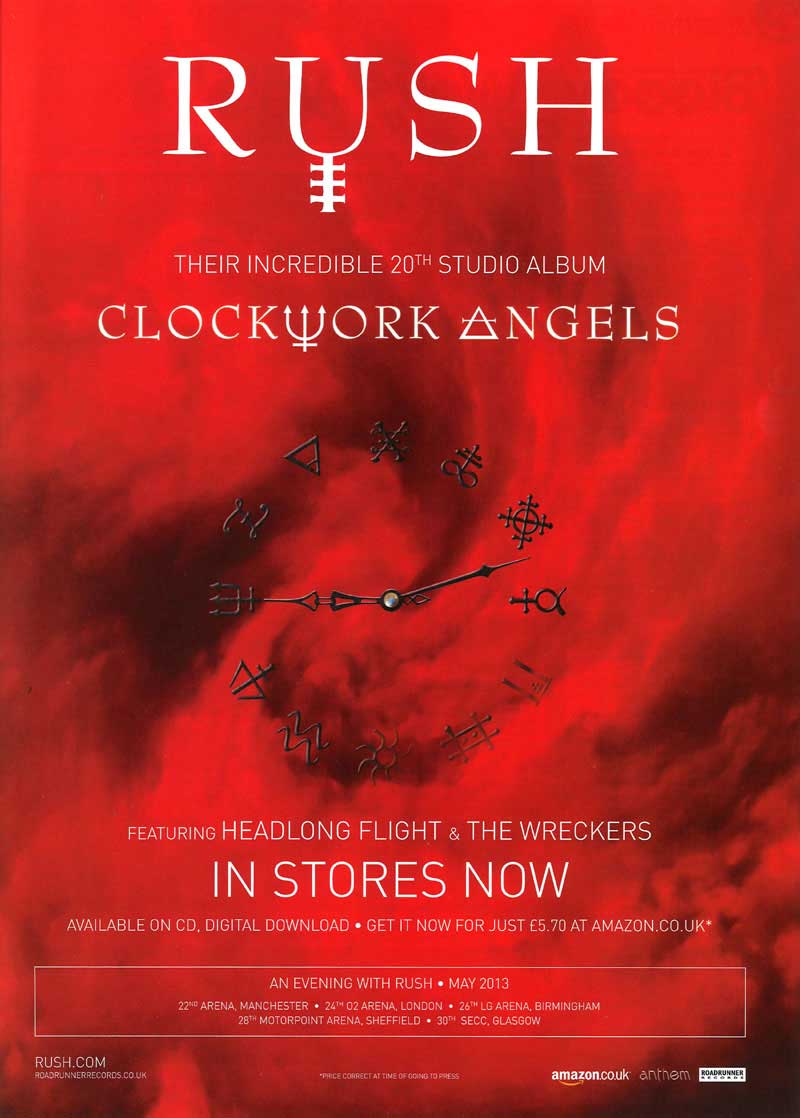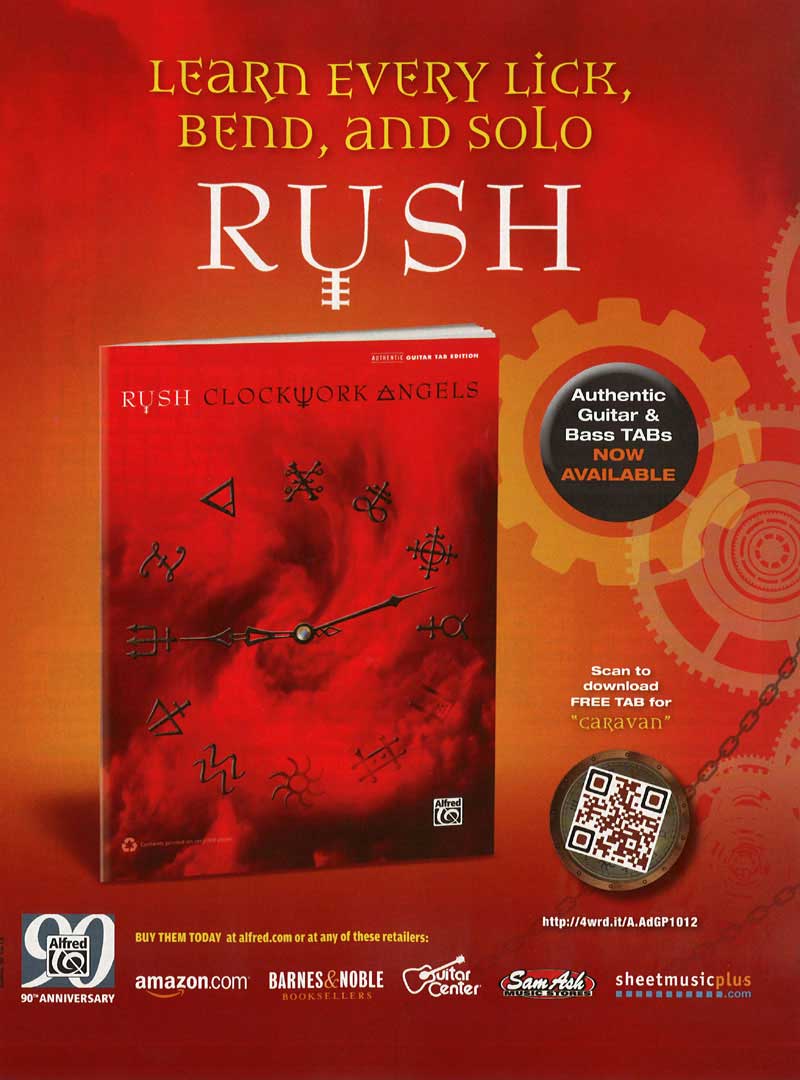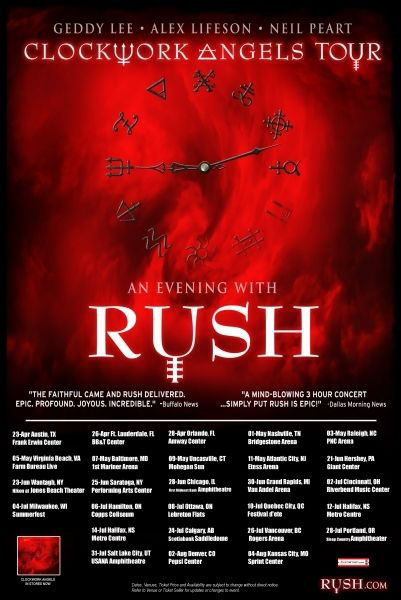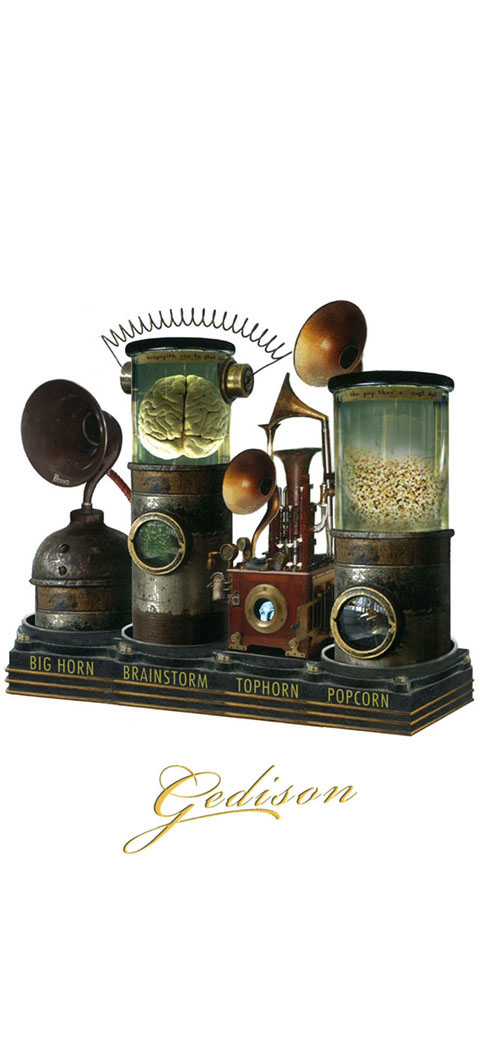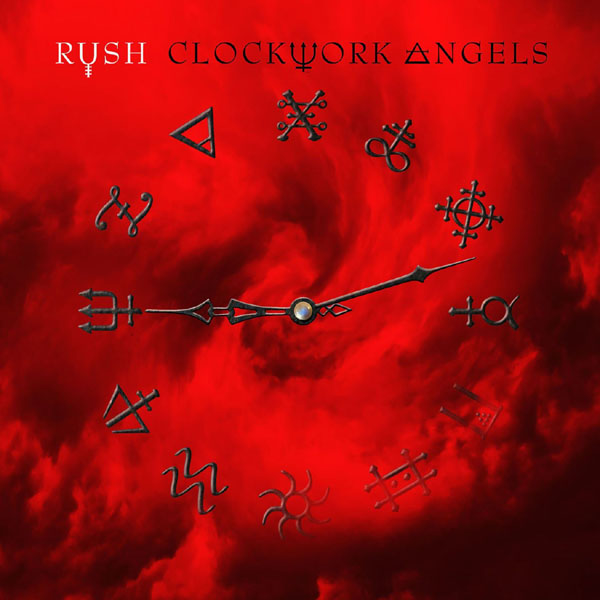
Caravan (5:40)
BU2B (5:10)
Clockwork Angels (7:31)
The Anarchist (6:52)
Carnies (4:52)
Halo Effect (3:14)
Seven Cities Of Gold (6:32)
The Wreckers (5:01)
Headlong Flight (7:20)
BU2B2 (1:28)
Wish Them Well (5:25)
The Garden (6:59)
GEDDY LEE bass guitar, keyboards, bass pedals, vocals
ALEX LIFESON guitars, keyboards
NEIL PEART drums, cymbals, tambourine
PRODUCED BY NICK RASKULINECZ AND RUSH
Recorded by Richard Chycki
Mixed by Nick Raskulinecz
'Caravan' and 'BU2B' recorded at Blackbird Studios, Nashville TN, April
2010
Assisted by Lowell Reynolds
All other songs recorded at Revolution Recording, Toronto ON, October-December
2011
Assisted by Stephen Koszler and Jason Dufour
Mixed at Henson Studios, Los Angeles CA, January-March 2012
Assisted by Martin Cooke
Mastered by Brian 'Big Bass' Gardner at Bernie Grundman Mastering, Hollywood CA
All songs composed by Lee and Lifeson, with lyrics by Peart
Arrangements by Rush and Nick Raskulinecz
Piano on "The Garden" by Jason Sniderman
Strings on "Halo Effect," "The Anarchist," "The Wreckers," "BU2B2," and "The Garden" arranged and conducted by David Campbell
Recorded at Ocean Way Studios, Los Angeles CA, January 18, 2012
Engineered by Paul Fig
Assisted by Rouble Kapoor
"BU2B" new intro recorded on Lerxst Mobile, West Hollywood CA
Management: Ray Danniels
Executive Production: Andy Curran
Associate Production: Pegi Cecconi, Liam Birt
Equipment supervision: Lorne "Gump" Wheaton, John "Skully" McIntosh
Art direction, design, and illustrations: Hugh Syme
Band portrait: Andrew MacNaughtan
Geddy would like to thank the good people of the following companies for
their technical contributions and support: Fender Musical Instruments and
the Fender Custom Shop, Tech 21, Orange Amplifiers, Moog Synthesizers,
Tom Brantley, James Hogg, Rotosound Bass Strings, and Jim Burgess of Saved
By Technology. I would also like to thank Nancy, Kyla, Julian, and Lauren,
for their constant and complete support, love, and understanding - and
it is my pleasure to introduce . . . The Wassermans ^..^^..^
Alex would like to thank: Pat Foley and the crew at Gibson Custom Shop
and Gibson Guitars, Hughes & Kettner Amplification, Dean Markley Strings,
Paul Reed Smith Guitars, Joel Singer and Audio Technica, Universal Audio,
Dave Welderman at the Guitar Center, Hollywood, and especially Adrian,
Charlene, Dylan, Justin, and Taylor. Farewell, Barbara and Paul.
Neil would like to thank: Don Lombardi, John Good, Louie Garcia, Garrison,
and everybody at Drum Workshop and Drum Channel; Mark Love, Chris Stankee,
and everybody at Sabian; Promark drumsticks, Remo drumheads, Darren Schoepp
at Roland, Jeffery at KellyShu Industries, Greg Russell at neilpeart.net,
Brutus at Bubba's Bar 'n' Grill, Freddie Gruber RIP, Peter Erskine, Lorne
"Gump" Wheaton, and on the home front, Keith, Jeanette, Jennifer, Adela,
Katie, Winston, and - lastest and mostest - Carrie and Olivia.
Our collective appreciation goes to: John McBride and all at Blackbird;
Joe Dunphy, Tanya Coghlan, and Amanda Pearl at Revolution (and Rene Lesko
at Kindred Spirits Catering). At Henson, Martin and Faryal; Barry and Clint
at BZ Brokers; and - O™
Extremely special thanks, as always, to our great support group at SRO/Anthem:
Ray Danniels, Pegi Cecconi, Sheila Posner, Meghan Symsyk, Bob Farmer, Andy
Curran, Cynthia Barry, Tyler Tasson, Emma Sunstrum, and Randy and Frances
Rolfe.
Brought to you by the letter Œ
Dedicated to the memory of our dear friend Andrew MacNaughtan,
February 25, 1964 - January 25, 2012
Notes
- June 12, 2012
- Highest Billboard Chart Position: debuted at #2 on the Billboard Top 200 with 103,000 sold the first week. In terms of actual detailed numbers, the morning of June 20th SoundScan reported the following: Total: 104,707; LP (Vinyl): 2,361; CD: 72,007; Digital: 30,339. Meanwhile up in the Great White North, Clockwork Angels debuted at #1 with 19,625 copies sold; LP (Vinyl): 367; CD: 14,311; Digital: 4,947. After eight weeks, the album rose back from #70 to #13 thanks to a $0.99 MP3 album sale at Amazon.com during week 7. The album dropped out of the Billboard Top 200 after spending 20 weeks on the chart.
- The "Caravan" single, labeled as "Parts One and Two of Clockwork Angels", was released June 1, 2010, on both CD and mp3. A 7" limited edition vinyl single was released in the US & Canada on April 16, 2011 for International Record Store Day; 3,000 copies were pressed on color vinyl (red or white) along with a lyric insert.
- The "Headlong Flight" single was released as a digital download on April 24, 2012, including both the 7:20 album version and a 5:05 radio edit.
- "The Wreckers" promo single was released on July 25, 2012, including both the 5:01 album version and a 4:21 radio edit.
- "The Anarchist" promo single was released on February 20, 2013, including both the 6:52 album version and a 4:18 radio edit.
- "The Garden" 10" picture disc single was released on November 29, 2013 for Record Store Day, including both the album version and Clockwork Angels Tour live version.
- Starting at the one o'clock position on the clock face, the symbols are Brimstone, Purification, Mercury, Winter, Zinc, Sun, Aquarius, Essence, Neptune, Lead, Earth, and Copper.




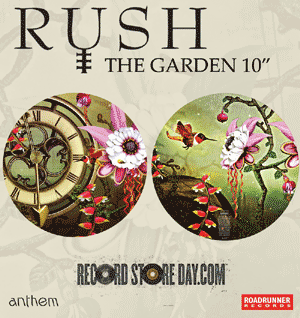
In Their Own Words
"Working with [Snakes and Arrows producer] Nick Raskulinecz, he's pushing us to think about doing another sort of concept record ... instead of just a thematically conceptual album like the most current records are. Whether we're up for that kind of thing, I'm not so sure. We'll have to wait and see." - Alex Lifeson, ToldeoBlade.com, November 30, 2008
"In this autumn of 2009, the three of us are poised on another kind of 'reinvention.' We have agreed to meet in Los Angeles in November, and discuss our future. We learned many years ago that when we finish one long project-like a two-year tour following a year or so of writing and recording for Snakes and Arrows-we don't make any further plans for a while. It's good to feel truly free for a time, and to clear your mind to focus on what you'd really like to do next. Of course, these are parlous times in the music business, so our time-honored pattern of touring, recording, and touring is no longer the obvious way to do things. The music world - or at least the business of it - is very different now, even since 2006, when we began work on Snakes and Arrows. The importance of 'the album' is not what it was, and there is currently a reversion to a musical climate rather like the 1950s, when only 'the song' matters. Radio, downloads, and 'shuffle' settings are inimical to collected works. Because of that reality, record company advances that used to pay for album projects are a thing of the past, so if that was what we wanted to do, we'd be on our own......To this point, the three of us haven't even discussed what we might discuss, so to speak - so our ideas and shared enthusiasm for the entity of Rush will be fresh, spontaneous, and quite likely exciting. For myself, I'm open to anything we can all agree on (I've pointed out before that in a three-piece band, we need consensus, not democracy - It's no good having one outvoted and unhappy member). My favorite group activity is always songwriting and recording, and I've got some lyrical ideas and those new drumming frontiers to explore. However, those rhythmic concepts would also be inspiring for a new drum solo, if we decided to do a tour of some kind, maybe with an orchestra. We could write and record just a few songs, and release them some way. Or there were a couple of film-and-music projects we had discussed in the past. In any case, there are enough possibilities for future collaboration, and I am curious to see what we'll come up with." - Neil Peart, News, Weather & Sports, November 2009
"...we feel a bit liberated by the state of the music business. Even since 2006, when we started Snakes and Arrows, the album has become less significant in these times of iTunes and shuffle settings and whatnot. But perhaps we can take advantage of that and work in a whole different way. So we decided, when we did meet, that we're not constrained by the patterns of the past, where you spend a year writing and recording, and the next year touring. Anything's possible now; we can record a couple of songs and put them out and then go on tour if we want. So at this point, we're just embarking on writing, but keeping ourselves open to all those other possibilities...I went to see a band called Porcupine Tree not long ago. And I was talking with (singer-guitarist) Steven Wilson. They just put out a 55- minute piece. That's a finger to the whole iTunes shuffle thing, and he intended it as such. And I thought, 'Yeah, that's another way of rebelling against it - by just saying no.' There's too much lost in giving up the integrity of an album - what it represents to you as a musician, and as a human being, for that matter. So I like that approach. That's very possible for a band like us. So there are no limitations; we might go big or we might go small." - Neil Peart, StCatharinesStandard.ca, February 5, 2010
"We have some stuff written, a couple of songs we wanted to release for the tour. In fact, what we talked about, originally, was just to play them live, not record them, and make it something kind of unique to the tour. But the more we got into them, the more we lived with those songs, the more we got into the idea of recording them...We are using [Nashville's] Blackbird Studios - great studio. Really, really good studio. Our producer, Nick Raskulinecz, lives here. He moved here from Los Angeles last year and, unfortunately, in Toronto there are no good drum rooms. Most of the great studios that used to be there are gone. There are a couple still left, but it was a question of where we would record drums more than anything else. We thought about doing it in L.A. Neil lives there. It would be nice for him to be home while we were working, but those studios weren't available either and Blackbird was, and Nick had had some experience there and used it quite a bit, actually. And It's a great place." - Alex Lifeson, Gibson.com (part 1), April 30, 2010
"...at Blackbird Studios in Nashville, on Tuesday, April 13, 2010, while I was being the 'time machine' - recording drum parts for two new Rush songs...It happens that the two songs we recorded that day in Nashville are detached from the past, rooted in the present, and pointed toward the future. Because they are the first two parts of what we envision as an extended album-length story..." - Neil Peart, News Weather And Sports, May 2010
"We always do this dumb thing where you do a tour and you're in such great playing shape, but you're exhausted so you take a year or a year-and-a-half off and then when you get playing again it takes awhile to get back up to that speed. So we thought, let's record a couple of tracks and get that spontaneity going, then let's tour and get back into shape and go straight into the studio, see if we can bring those chops in and see where that gets us." - Geddy Lee, TheStar.com, June 9, 2010
"I told the guys about an idea for a fictional world that had interested me lately, thinking it would make a great setting, maybe for a suite of songs that told a story. A genre of science fiction pioneered by certain authors had come to be called 'steampunk,' seen as a reaction against the 'cyberpunk' futurists, with their scenarios of dehumanized, alienated, dystopian societies. Our own previous excursions into the future, 2112 and 'Red Barchetta,' had been set in that darker kind of imagining, for dramatic and allegorical effect, but I was thinking of steampunk's definition as 'The future as it ought to have been,' or 'The future as seen from the past'-as imagined by Jules Verne, for example, in 1866, when he was writing 20,000 Leagues Under the Sea. When I was nine or ten, my dad took my brother and sister and me to see that movie at a Saturday matinee, and images from it had always stuck with me. The fearsome destructiveness of the Nautilushad a kind of monstrous beauty, contrasted with the cultured opulence of Captain Nemo's quarters, and the massive pipe organ on which, he played with mad rapture. The captain may have been insane, but it was a romantic, idealistic bind of madness-his mission was only to destroy ships of war, because his beloved family had been killed in wartime. The guys seemed intrigued by the concept, and at home in Southern California, I started working on a story and some lyrics along those lines, set in a world driven by steam, intricate clockworks, and alchemy-'a world lit only by fire'..." - Neil Peart, Time Machine Tourbook
"'BU2B' (the guys thought my original title of 'Brought Up to Believe' was too unwieldy, so I found it musing to render it in modern social-networking textese)." - Neil Peart, Time Machine Tourbook
"There is the epic song, 'Clockwork Angels,' which is really taking shape. It's a multi-parted piece, very dynamic. Then there's some stuff that's very melodic and on the softer side, on acoustic, with a strong melody. So there's great diversity there. Honestly, I can't wait until we start really working on these songs. We've sort of got them to the stage where Geddy and I were happy with the arrangements and then Neil kind of comes in and starts working on his drum arrangements, and they go from there. So they're sort of in that pre-drum stage right now, and it's great to see them come to life." - Alex Lifeson, Allentown Morning Call, August 25, 2010
"In the case of 'BU2B', at first we experimented with something more traditional, but it just sounded, I don't know - ordinary. So we decided to punctuate points in the solo section with a more screaming guitar presence. I think it worked." - Alex Lifeson, MusicRadar.com, August 31, 2010
"As you know, the album format seems to be dying in some ways. Rush are traditionalists, so I don't think it'll die for us. This is the first time that we released any new material independent of an album, which was a good thing for us. We wanted to do something different and step out of the box a little bit. It's something we might do again: spend a month or so writing, record two or three songs and release them. Why not?" - Alex Lifeson, MusicRadar.com, August 31, 2010
"I can already tell you that the title track is going to be one of the coolest things they've ever done. It's going to be epic. I told them, 'Don't try to write a single. Don't try to do anything conventional. Give me Rush from back in the day.' They don't need to write something for the sake of radio play. They're Rush! [laughs] So I think the record is going to be a little more bare bones, a little less produced. It's going to be more direct, with killer riffs, solos, pounding drums and Geddy singing up high the way he should. That, to me, is the sound of Rush." - Nick Raskulinecz, MusicRadar.com, November 3, 2010
"The whole idea of doing Moving Pictures and not sharing it, particularly in the UK, was a real concern of ours. So Ged and I will get back to writing in the new year. We'll get through the Christmas holidays and start writing through January and February. We only have two or three more songs that we feel we need for the album. So we can start reworking the material and get it in great shape. Then we'll prepare for the tour in March, finish in July, take the summer off then start work in earnest in September." - Alex Lifeson, Musicradar.com, January 10, 2011
"We've got about 3/4 of the record written and are kind of ready to go. We've got 2 or 3 more tracks we'd like to write. We've kind of run out of time now. We're gonna have to go on tour so when this tour is over we'll get back to writing and hopefully finish the record in the Fall. We're having fun with it...there are some very complex moments. There are some very beautiful moments. It's kind of what you'd expect from Rush I guess - a little bit of everything. Now the indication you can get from the first 2 songs kind of sets the tone for where we're going with this record. But there are a few surprises as you get deeper into the record." - Geddy Lee, UK's 106.1 Rock Radio, March 30, 2011
"Nick is a very bad influence. He wants us to be more Rush than we are, it's wonderful, he pushes me in ways I wouldn't dare. In the middle of Caravan there's a ridiculous fill and it was Nick who wanted me to go all the way down the toms and back up again and once I'd done it, my comment was, 'I'm so ashamed!'. He was in the studio outlining his idea to me, and Geddy's sitting down next to us and he looks up over his glasses and says, 'Oh, he wants to make you famous'. I would have never have proposed some of Nick's arrangement ideas to my bandmates, I'm not that brash, we're not that brash ... we're Canadians." - Neil Peart, Classic Rock Presents Prog, #16
"It was hard for me to set the album aside to tour, this really means a lot to me, I intend it to be my highest achievement lyrically and drumming wise, so I really want to get it done while we still can." - Neil Peart, Classic Rock Presents Prog, #16
"It's been quite weird because we've never really taken so long and interrupted a writing process so many times. We have about six songs finished and waiting to go into pre-production and then be recorded. We've been kind of afraid to go back to them, because we don't want to start fucking around with them, we liked them at the time...Alex and I tried to do some writing on this break. We've had three months, so we thought 'Okay, so maybe we should get all of the rest of the record finished'...but Neil just had a baby last year and he needed to use that time to be a dad and to be domestic, and he didn't want to uproot and get into this intense writing session, and that was totally cool. So Alex and I have been getting together regularly and jamming, and now we have a lot of good material just lying around in suspended animation...We're going in a conceptual direction on this record, for sure...We started with a 10-minute song idea that then turned into a concept and it's feeding off itself. It's like that question that Steven Colbert asked us in the movie. 'Are your songs so long that by the end you're influencing yourself?' I think we're doing that now. We're like a feedback loop, influencing ourselves now. We're spending so much time on this concept. It's been fun, because we haven't gone down that road in a while. Let's see if we can pull it off!'" - Geddy Lee, Classic Rock Presents Prog, #16
"We got lyrics very early on before the last tour. We had five songs written, at which point Neil had an idea of what the concept would be. What happened was, when we went into the studio to record "Caravan" and "BU2B" to take on the road with us, it gave Neil some time to formulate the story and get it into his head. By the time we got back into writing, he redid a lot of the lyrics and changed the direction of the story. It evolved over a period of time. And then, of course, when we attacked the new music, we went into a different direction ourselves." - Alex Lifeson, Guitar World, September 2012
"'Headlong Flight' was one of those songs that was a joy to write and record from beginning to end. Alex [Lifeson] and I had blast jamming in my home studio one day before the 2nd leg of the Time Machine Tour and I did not revisit that jam until a year later. Alex and I assembled the song to be an instrumental and its original title was 'Take that lampshade off yo head!' but once we saw the lyrics Neil had written for 'Headlong Flight,' I knew that the spirit of the lyrics matched the instrumental perfectly and it was just a matter of making them fit and writing the melodies." Geddy Lee, PRNewswire.com, April 19, 2012
"In late 2011, my drum teacher Freddie Gruber, towards the end of his long and adventurous 84 years, was reminiscing among friends and former students. Often he would shake his head and say, 'I had quite a ride. I wish I could do it all again.' That is not a feeling I have ever shared about the past -- I remain glad that I don't have to do it all again. While working on the lyrics for 'Headlong Flight,' the last song written for Clockwork Angels, I tried to summarize my character's life and adventures. My own ambivalence colored the verses, while Freddie's words inspired the chorus 'I wish that I could live it all again.'" - Neil Peart, PRNewswire.com, April 19, 2012
"This 'one of many possible worlds' is driven by steam, intricate clockworks, and alchemy. That last element occurred to me because I was intrigued by Diane Ackerman's use of a few alchemical symbols as chapter heads in An Alchemy of Mind. They seemed elegant, mysterious, and powerful. Soon I learned about an entire set of runic hieroglyphs for elements and processes, and as with the tarot cards for Vapor Trails, and the Hindu game of Leela for Snakes and Arrows, I became fascinated with an ancient tradition. As the lyrical 'chapters' came together, I chose one symbol to represent each of them, for the character or mood. Those would end up arrayed on the cover clockface, as first used on the 'Caravan'/'BU2B' single in early 2010. Since then they have shifted a little, as the story has grown, but you can find brimstone at one o'clock for the faith-bashing 'BU2B,' gold at six o'clock for 'Seven Cities of Gold,' earth at eleven o'clock for 'The Garden,' and so on. (The ' ?' in Rush stands for 'amalgamation.') - Neil Peart, Clockwork Angels Tourbook
"Geddy Lee and Alex Lifeson originally worked on the music together in a basement studio, sometimes with Lifeson giving Peart two demos of a tune - one with a drum machine illustrating rhythmic ideas, the other a click-track. "Alex had put together one collection of ideas that turned out to be most of the song Clockwork Angels,' says Peart. "As soon as I heard its rhythmic feel, which was so different for us, my response was 'I want to play that!'" Carnies and Headlong Flight were of 'furious jams', and there was an 'immediate spark of connection' with Seven Cities Of Gold, Alex Lifeson says, "We talked about having a raucous beginning that related to the middle 'solo' section, and as the song evolved it took on the appropriate character; entering the city with all the wild, dangerous sensory experience it offers." Peart asserts that Lifeson's solo on The Gardenwas, "A few takes recorded casually and assembled into an improvised performance that remains his personal favourite."... The Wreckerswas the result of Lee and Lifeson swapping instruments during writing sessions but, "Once we switched into recording mode," says Peart, "it was back to the same old us." - Classic Rock Presents PROG#25, April 2012
"'The Garden' solo was recorded one afternoon in Geddy's studio. He had taken a day off, so I came in and updated a few of the songs, getting caught up cleaning tracks and recording newer versions of guitar, keys, and drum parts. I wanted to fill in the 'insert solo here' space with at least something. I fiddled with some guitar plug in settings in Logic and quickly recorded a few passes, and then edited them for the final version. After completing it and listening back, I thought, 'hmm, that kind of fits perfectly!'. The solo you hear on the album is that very same solo, a quick throw away that worked, and this has happened on other songs as well, such as the solo on 'Leave That Thing Alone', acoustic verses in 'Bravest Face', and the solo on 'Bravado' to name a few." - Alex Lifeson, Guitar Connoisseur, May 11, 2016
"Two weeks or so into it, as Geddy and Alex were writing more music, we all kind of looked at one another and said, 'Hey, this is really turning into something. It's tying together.' Then one day, Neil walked in the room and said, 'It's done. I finished it.' For the next 20 minutes, Neil talked about this vision he had for the concept of the record, and it was one of those moments I'll never forget. Listening to him, watching him speak - it was amazing! I wish we were filming him so we could put it on YouTube. And right there, the whole record just clicked. Once Geddy and Al heard where Neil was going, they churned out some amazing music. I think Headlong Flight came the next day." - Nick Raskulinecz, MusicRadar, May 8, 2012
"While we were recording, there were definitely things I wanted to do in the mix - different effects, vocal sounds... The whole middle section to Clockwork Angels, that bluesy bar band section, that definitely happened in the mix. The ending part of Seven Cities Of Gold, where the drums and the rhythm section fade out and you're left with those big, beautiful guitar chords, that was in the mix." - Nick Raskulinecz, MusicRadar, May 8, 2012
"It's funny because the solo in 'Clockwork Angels' and also the solo in 'The Garden' which are two of my favourite solos that I've ever done, were throwaway solos. After we'd written those songs and worked on the arrangements, Geddy went away for a few days, so I continued working and filling things in a little bit and I threw down a couple of solos in just a few takes and that was it. The thing is that after a while they kind of grow on you and you don't think about them when you're doing them as they were so natural and spontaneous so those solos were two throwaways that I did very early on before those songs were really fully developed. With me, when I don't think too much about what I'm doing that's when I tend to do my best work." - Alex Lifeson, Metal Express Radio, May 21, 2012
"I wanted the songs to be a collection that could stand on their own, outside of context of the whole story. When you look at a collection of songs like those on the Who's Tommy, you could pull "I'm Free" out of that and it still stands on its own. But in connection to the story, it takes on another interpretation. So there was a lot of discussion about that. I think at one point, Neil was a little frustrated with my determination to keep the story-line minimal in a sense...The three times we attempted side-long concept pieces in the past, the music was really like one song broken up into many parts. The thread connecting the music on Clockwork Angels is the story-line. That's the key difference." - Geddy Lee, Spin.com, May 22, 2012
"This time we wanted to restrict the way we used overdubs. We wanted it to be very much a three-piece record." - Geddy Lee, Spin.com, May 22, 2012
"I think then you get to a point where you're comfortable with your own sense of yourself. In our case, we've got such a catalogue of ideas that it's hard not to run over ourselves. For me, we're in a place now where we'll find ourselves mimicking ourselves in a way, and doing that in a kind of intentional way, but tongue in cheek - it has to have a purpose. For example, there's a song on the album called Headlong Flight, and when Alex and I started jamming we realized that we had written this bit that sounded really similar to the opening of a song called Bastille Day that we wrote many years ago. You know, we kind of laughed about it and didn't pay too much attention to it, and we created this long instrumental piece that kind of had a silly name, and we were just going to leave it at that. But when the lyric came along and we realized that this was a song at a point in the story where our hero is looking back on his life, reminiscing about the good and the bad, and regardless, he still wishes he could do it all again, I realized there was a real opportunity to use that bit of our past as a kind of Bastille Day Redux. So we had fun with it, and it suited the story, you know, so I don't worry so much about whether I'm treading on ground that I tread on 30 years ago. It depends on the panache with which I deliver it. I'm bringing a whole 30 years of experience to that kind of idea, and I know that I'm not going to settle for just a rehash of some old idea. It's got to bring something fresh to the end result, and it's got to be transformed by that new context." - Geddy Lee, MusicRadar.com, June 25, 2012
"We wanted to record ["The Wreckers"] that way, thinking that live we'd switch instruments, too. But when we got to the recording, the song had evolved so much that the sweet strumming he was doing on the Nashville was replaced by some very fast strumming. So we used our own main instruments, but I basically played his part, and he used my bass arrangement. It was very cool, not only that we would switch instruments and write the song that way but also that we would respect each other enough to continue with the arrangements that each of us had written." - Alex Lifeson, Guitar World, September 2012
"In the choruses [of "Carnies"], when you get that real carnival sense, I used one of the plug-ins, Guitar Rig 5. I don't remember the actual sampled sound; I'm going to have to go back to the earlier versions in Logic to find out - which I'm going to have to do anyway for when we play the song live. But there was this one that had a very funny tremolo, kind of square edged, and all I did was put it on the guitar part that I played. So it's really that three-chord progression that repeats itself, and it's got this secondary effect on it that goes in and out, and it's almost like a carousel. Ged and I were like, 'Oh my God, that's so cool!' It really sounds like you're on this horsey going up and down." - Alex Lifeson, Guitar World, September 2012
"'The Garden' and 'Clockwork Angels' are solos from the demos. For 'Headlong Flight,' that song is so rockin' that I just wanted [Alex] to sit in front of the console with a Les Paul and a wah pedal and go for it. What you hear on the record is his first and only take. As soon as he was done I said. 'Whoa! That's it'. After he did that solo the room erupted into laughter, howls, and high fives." - Nick Raskulinecz, Guitar Player, November 2012
"For a few records there, I was really layering my voice with multipart harmonies all the time, and he wanted to see a more direct approach with my vocals this time-less harmony, or at least just very specifically used harmony." - Geddy Lee, Premier Guitar, November 2012
"With 'Headlong Flight'-it was kind of an accident: Alex and I were jamming, and we go, 'Oh, [expletive]-did we just rewrite 'Bastille Day'? [Laughs.] Because we had assembled that into a complete instrumental song at that point, and at first we were happy to let it be kind of a cheeky nod to the past. So the song was finished, but then I got lyrics from Neil and realized that, at this part of the story, [the protagonist of the album's storyline] is looking back over his life and thinking back over his life-thinking about things that he regrets, things he doesn?t regret-and the main line is 'I wish that I could live it all again.' So, it seemed oddly appropriate that we were reminding ourselves of where we'd been, too." - Geddy Lee, Premier Guitar, November 2012
"Neil had developed a character known as the Pedlar whom he described as 'a kind of amorphous phantom who drifts through the story, prompting soliloquys from the major characters'; in his mind, this person was a 'provocateur, an enigma, in disguise,' someone who keeps whispering things in your ear (What do ye lack?), and as such an important device for exposition in a song of his own. Were this a novel with the space to develop such a character, Lerxst and I could see Neil's point (and he was in fact already working on a novelization of the story), but within the more limited confines of a rock opera we felt it would be easier to convey his presence by way of a leitmotif or just a musical mood complemented by some story notes with the lyric sheets, as we'd done for the Starman on 2112. With so many songs already segueing nicely, another big representational piece of music with dialogue felt bulky and superfluous. With it, Lerxst and I were afraid of gilding the lily, of bloating the opera. We'd be losing focus. We hoped to accomplish the same thing by making the mood more ominous to represent the Pedlar's malevolent spirit, like you hear in 'Carnies.' Throughout the sessions, the Pedlar Conundrum persisted. Neil kept on making his case for more character exposition, and we did try to make it work, eventually reducing the Pedlar's presence to one simple line that appears twice on the album-'but even that line had its controversy. He wanted me to sing or say 'What do ye lack?' but every time I tried to sing 'ye,' I felt like a pirate with a peg leg and parrot: 'Urrgh, matey. What do ye lack?' and Lerxst would double over laughing. So I suggested simply replacing 'ye' with 'you,' but in the end, Neil volunteered to voice it himself. Done deal! That and the addition of story notes worked for everyone. So, if you listen to the very end of the album's title track, you can hear Pratt whispering it himself"- Geddy Lee, My Effin' Life
"We were in L.A. mixing the record, and we wanted to insert this little bit of a lyric or a presence that Neil wanted to have in there, and we thought, 'How can we add to it without taking away, and make it something different-but not another song?' So we recorded that in my hotel room, Geddy and I. We stuck the mic outside and recorded the morning traffic and sounds of Los Angeles from our hotel room, and then I did the acoustic tracks and threw a vocal track on it." - Alex Lifeson on the new intro to "BU2B", Premier Guitar, November 2012
"We actually went during the Clockwork Angels tour, and recorded three tunes after the album was released, from the record, that did't have strings originally. And we recorded a version of them that now had the string parts that had been arranged for the tour. Those were going to be released as bonus tracks or separate tracks (on a later release). We did that while we were in Los Angeles performing." - Jacob Szekely, Clockwork Angels cellist, rushcast.podbean.com, March 6, 2015
"To me, [Clockwork Angels] would make an amazing movie and I thought it would happen organically - that by now somebody would've been at my door with a big bushel of dollars: 'Let's make this happen!' And it hasn't. But we've got the graphic novel done and we're building the world and the vision of it. It's astonishing to me, really, that somebody hasn't come to me wanting it. I thought, what a great semi-retirement project for the three of us, 'cause Geddy loves cinema, Alex for the soundtrack and me for the story. But I was hoping that's a project that the three of us would undertake at some point." - Neil Peart, RollingStone.com, June 30, 2015
Promos
Smartphone Wallpaper
Our RUSH smartphone wallpapers have been modified for a 9:19.5 aspect ratio to fit "most" Smartphones.
This is a collection of transcripts of magazine and newspaper articles and other media related to this release or coinciding with the time frame surrounding it. This is an ongoing work in progress; feel free to email any suggested additions.

